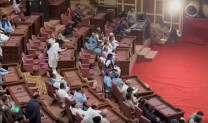Land of the damned

The devastation in Gojal is overwhelming, and even more bewildering is the possibility of more destruction which could be wrought by untamed, unfettered waters which now rise to a height of over a hundred meters in the recently formed lake in Attabad. Despite the efforts of state actors as well as private players, the battle to harness nature may be one that we could lose. Whether the collapse of an entire mountain side into the river is the result of human behaviour or natural convulsions is now irrelevant. Whether we, as a nation, can rise to the occasion in order to mitigate further damage to the environment and to alleviate the suffering of the people of the Hunza Valley is the essential question.
Have we, over the years, come to grips with the shocks that our people face every day, rendering them vulnerable to the most common of occurrences such as ill-health or the loss of a job? Have we, as a state, designed and operated an adequate social welfare system which provides basic necessities to citizens across the land? Are there adequate safety nets for those who are vulnerable to risk, whose lives are spent with the certainty of incertitude? What happens when the meagre meals you could feed your children are no longer available, when the roof that shelters you from the seasons has disappeared, when the animals who sustain you have drowned, when the dreams you have nurtured are shattered? What happens when the homes you have lived in and loved are swept away, when the family which has supported you is no more, when the friends you have played with are gone? Where do you go when the land that you have tilled falls away, when the water that sustained you threatens to drown you, when the songs you sang are silenced?
Much as we endorse the work of the organisations working tirelessly at coping with the increasing pressure of water in the Attabad Lake, and much as we salute the fortitude of those whose lives could be torn asunder by a violent overflow of the damned water, we must look closely at the systems which fail to provide comprehensive emergency care for displaced and threatened populations. In a country where a spiral of displacement has been set into motion by the devastating earthquake of 2005, where thousands of people have been displaced by conflict in recent years, it is time to consider that this might just be the beginning of a new era of upheaval where those who live on the edge are damned, not just by waves of angry, swirling water, but by those who have stood by, eyes averted, hearts closed, as lives are torn asunder, homes torn apart, the earth fractured, with only a leaden sky to shelter them.
Published in the Express Tribune, May 24th, 2010.



















COMMENTS
Comments are moderated and generally will be posted if they are on-topic and not abusive.
For more information, please see our Comments FAQ